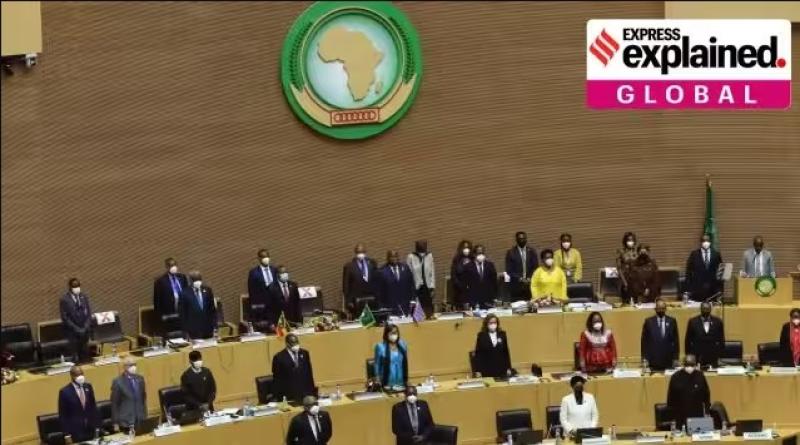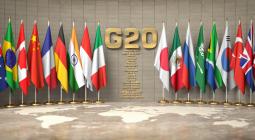African Union in G20: A look at the G20’s latest member

Launched in 2002, the African Union (AU) is an intergovernmental organisation of 55 member states located on the continent of Africa. What are some its accomplishments and what can be the upshot of its inclusion in G20?
The African Union (AU) was admitted as a new member of the G20 on Saturday (September 9), barely three months after India floated the idea of including the organisation. The development took place at the ongoing 18th G20 Heads of State and Government Summit in New Delhi.
What is AU? Why was it formed? What is the significance of the AU? What has it achieved so far? Here is everything you need to know about the group.
What is the AU?
The AU is an intergovernmental organisation of the 55 member states located on the continent of Africa. Launched on July 9, 2002, the grouping is the successor of the Organisation of African Unity (OAU), which was formed in 1963 (more on this later). The AU seeks to build “an Integrated, Prosperous and Peaceful Africa, driven by its own citizens”, according to its website.
The AU’s secretariat, the African Union Commission, is based in Addis Ababa. Collectively the group has a gross domestic product (gdp) of $3 trillion with some 1.4 billion people.
Why was the AU formed?
The AU’s predecessor, OAU, was also an intergovernmental organisation and it aimed to bring African nations together and resolve common issues through collective action.
Its main focus, however, was to help liberate the colonised countries on the continent. To do so, OAU mustered diplomatic support and provided logistical aid to liberation movements across Africa.
“Its Liberation Committee, based in Dar es Salaam (the Tanzanian commercial capital), donated weapons and funds to the insurgencies in South Africa, Zimbabwe, Namibia, Angola, and Mozambique,” wrote Keith Gottschalk, a political scientist at the University of the Western Cape (South Africa), in his article, ‘60 years of African unity: what’s failed and what’s succeeded’, published by The Conversation.
OAU’s efforts helped numerous African nations gain independence from their European colonists in the following years. But the organisation suffered from major shortcomings. It failed to fillip political and economic integration among its member countries. Therefore, it was decided to reform the OAU during the mid-1990s, which ultimately led to the formation of the AU.
Notably, the man spearheading the idea of the AU was the Libyan dictator Colonel Muammar Gaddafi. “He also did more than any other leader to ensure the creation of the African Union (AU) in 2002, hosting several meetings, and forcing Nigeria and South Africa to react to his frantic drive towards creating a federal body,” an analysis published in The Guardian said.
What are the objectives of the AU?
Unlike the OAU, the AU concentrates its energy and resources on achieving greater unity and solidarity between African countries and their people. It seeks to accelerate the process of the political and socio-economic integration of the continent.
Moreover, the AU addresses the multifaceted social, economic and political problems that the African nations have been facing. Its key objectives also include promoting peace, stability, and security across the region. Protecting and promoting human rights are also part of the agenda.
What are the notable achievements of the AU?
Many of the AU’s peacekeeping missions have helped governments tackle terrorism across Africa, from the Sahel to northern Mozambique. Over the years, the organisation’s interventions have prevented violence in countries like Burundi, the Central African Republic, Comoros, Darfur, Somalia, South Sudan, Sudan, and Mali.
AU’s diplomatic efforts have also resulted in resolving conflicts in Africa. Last year, it brokered a peace deal between the Ethiopian Government and the Tigray People’s Liberation Front (TPLF) in South Africa, almost two years after the two entities began fighting.
The establishment of the African Continental Free Trade Area (AfCFTA), which came into force in 2021, is yet another achievement of the organisation. With 54 member countries as signatories, AfCFTA is the world’s largest new free trade area since the establishment of the World Trade Organization (WTO) in 1994.
It seeks to increase intra-African trade through deeper levels of trade liberalisation and enhanced regulatory harmonisation and coordination. The AfCFTA will increase Africa’s income by $450 billion by 2035 and increase intra-African exports by more than 81%, according to the World Bank estimates.
What have been the shortcomings of the AU?
One failure of the AU has been its inability to thwart coups in Africa. Since the 1960s, the continent has witnessed more than 200 coups – the most recent ones took place in Gabon and Niger.
“The obvious reason is that the continental body never sends a military intervention to suppress the putschists, to capture them and bring them to trial for treason. It limits itself to diplomatic pressures against them, such as suspending their membership,” Gottschalk wrote in his article.
The organisation has also been unable to get its member countries to pay their annual dues, leaving it starved of funds. As a result, it has to depend on external funding, which impacts its autonomy.
What can be the upshot of AU’s inclusion in G20?
“The AU now has an opportunity to use its G20 permanent seat to craft a win-win pathway for the entire world with an uncompromising demand to redesign the global trade, finance, and investment architecture,” Fadhel Kaboub, associate professor of economics, at Denison University, President, Global Institute for Sustainable Prosperity, told the media.
Meanwhile, Kenya’s President William Ruto said the group’s inclusion will give African interests and perspectives voice and visibility in the G20.






